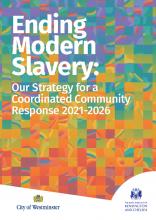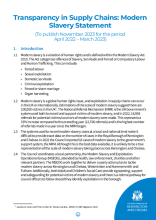Modern slavery
On this page
In an emergency, always call 999. If you come across anything suspicious or need support, contact the Modern Slavery Helpline, 08000 121 700 (open 24/7)
What is modern slavery?
Modern Slavery is an umbrella term for human trafficking and servitude. It is used when somebody is forced or coerced to do something, and another person gains from this.
The most common ways people are exploited are:
- forced labour – being made to work for little or no money
- sexual exploitation – being coerced or forced into selling sex
- domestic servitude – being made to work within a home environment for little or no pay
- criminal exploitation – being forced to break the law for someone else (begging, selling drugs)
- forced/sham marriage – being made to marry someone you don’t want to marry
What does modern slavery look like?
Modern slavery is often hidden in plain sight, making it hard to recognise victims. It can affect anybody of any age, gender or ethnicity.
People are often unable to escape because of fear for their own lives or for the lives of their family, or because they don’t know who to turn to or who to trust.
How to spot the signs
Someone might be being exploited if:
- they allow someone else to speak for them
- they believe they have debt to pay off
- they have little or no contact with family
- they struggle to trust authorities
- someone else has their passport
- they are unable to take days off or leave a work environment
For more information and specific signs for each type of exploitation, visit the STOP THE TRAFFIK website.
What to do about it
By learning the signs, you can help spot modern slavery in our communities; and by spotting it, we can stop it.
- in an emergency, always call 999
- if you come across anything suspicious or need support, contact the Modern Slavery Helpline, 08000 121 700 (open 24/7)
- to report your concerns anonymously call CrimeStoppers on 0800 555 111 or visit the Crimestoppers website.
There are many organisations working in Kensington and Chelsea to provide support for survivors of modern slavery. Details of these can be found on the Angelou website.
What is the council doing about modern slavery?
We take a Coordinated Community Response to tackling modern slavery. This means it is everyone’s responsibility to work together to help achieve our objectives of identifying and supporting victims, bringing exploiters to justice, and preventing modern slavery from happening.
We have a new Bi-borough Modern Slavery and Exploitation Strategy. This strategy has been coproduced by a range of partners, including by survivors and residents, and sets out our vision for ending modern slavery and how we can all work together to achieve this.
We have an active partnership group, made up of a range of agencies including the Council, police, NHS and local specialist charities, who work together to oversee our strategic response. The Council also has internal referral pathways and regular training for staff.
We recognise that as a public body, the Council has a responsibility to ensure that we are mitigating the risk of modern slavery and exploitation in our organisation and in our supply chain. This is why we have developed a Modern Slavery Statement outlining the steps we are taking to mitigate this risk and we encourage businesses in the borough and in our supply chain to do the same.
Please email [email protected] for previous versions of the Modern Slavery Statement.
Last updated: 10 April 2024


